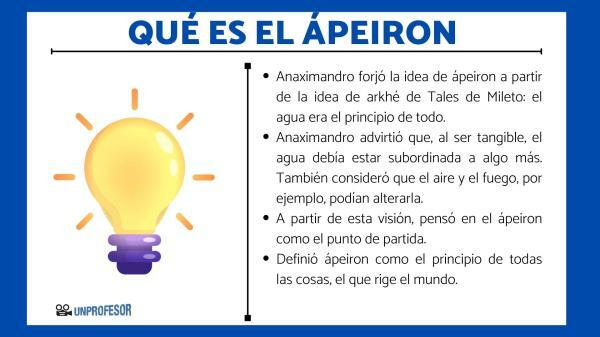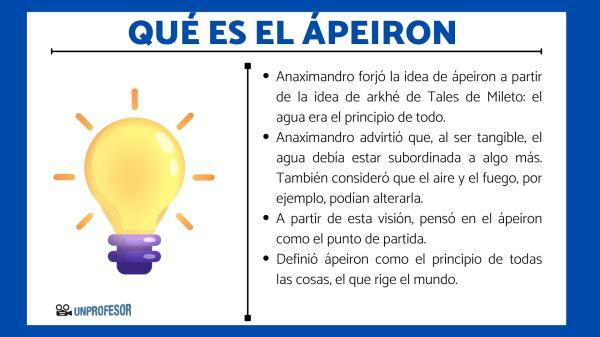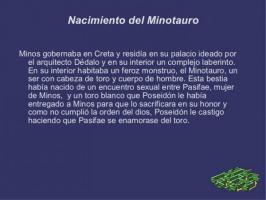What does ÁPEIRON mean in philosophy and examples

In this lesson from a TEACHER we are going to talk about one of the oldest concepts or principles of philosophy, the aperion. A principle outlined by Anaximander of Miletus (610-545 BC) C.) in his book about nature, which is considered the first analytical and research work of the classical world.
In this way, the aperion principle is defined as the principle of all things that rule the world. In addition, we must take into account that it falls within the school of miletus, approximately in the SVII-VI a. c. and within what is known as the presocratic philosophy.
If you want to know about what does ápeiron mean in philosophy and examples, keep reading!
Before explaining what the aperion is, we first need to contextualize it so that you fully understand it. In this way, this concept must be located within the presocratic philosophy and in the school of miletus. Founded by Thales of Miletus(624-546 BC) C.), considered the first philosopher of the West.
Thus Thales and his disciples, Anaximander and Anaximenes
, stood out for their contributions on the origin of the world from a scientific prism. That is, for the first time these three sages tried to explain natural phenomena through a scientific method and understand how the universe was formed- Thales of Miletus (624-546 BC C.): he is considered the first philosopher and mathematician of the West. To him we owe the arche concept, which is that substance which is the origin of the universe. Furthermore, he thought that the main essence of the universe was the Water.
- Anaximander of Miletus (610-545 BC) C.): He was one of the most important philosophers and geographers of the classical world. In addition, among his most important contributions we find the development of the earth chart, the measurement of the equinoxes and solstices, the ápeiron (the principle of all things) or his idea of evolution of living beings.
- Anaximenes (570-500 BC) C): He is the third philosopher of this school and a disciple of Anaximander, with whom he shared the idea that the arkhé was infinite, although not indeterminate. For Anaximenes, the principle of all things is the air, which through the processes of condensation and rarefaction, changes substantially.
Anaximander forged the idea of ápeiron from the idea of arkhe Thales of Miletus, who postulated that water was the beginning of everything. Anaximander warned that, being tangible, the water had to be subservient to something else. He also considered that air and fire, for example, could alter it. From this vision, he thought of the ápeiron as the point.
In this way, he defined ápeiron (without limits or without definition) as the beginning of all things, the one that governs the world, that which is indefinite, indeterminate, eternal, that which has no end and from which all things arise.
“...The principle (arjé) of all things is the indeterminate (ápeiron). Now then, where there is generation for things, there destruction is also produced, according to need; in effect, they pay each other's guilt and reparation for injustice, according to the order of time...”
On the other hand, it also establishes that in the apeiron everything goes out and comes back (all beings arise and derive from it) through a succession and cyclical struggle of opposites (day-night, hot-cold, wet-dry...). At a given moment, one of the opponents triumphs over the other, creating an unfair situation, intervening the cosmic justice to solve this injustice (first approximation to the idea of Christian God).
Cosmic justice will make the previously defeated opponent triumph, thus beginning the cyclical process of change that characterizes our reality.




